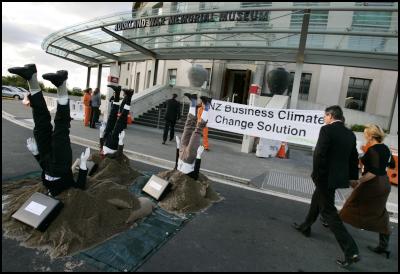Big business turns to long-time UK climate sceptic
Big business turns to long-time UK climate
sceptic

Click for big version
Auckland 15 November
2007 – Greenpeace visibly demonstrated today that the New
Zealand Business Roundtable, Greenhouse Policy Coalition and
other business groups have their heads in the sand over
climate change. (1). The organisation hung a banner reading
'NZ business climate change solution' behind several
mannequins rested upside down with their heads buried in
sand outside the Auckland War Memorial Museum, where Lord
Nigel Lawson, a well known climate sceptic will be
speaking.
The New Zealand Business Roundtable - which has a history of trying to delay and weaken action on climate change (2) - has flown Lawson, a well known UK neo-liberal economist and long-time climate sceptic, to New Zealand as their guest to talk to a predominantly business audience at the Auckland War Memorial Museum this evening.
"Lawson's visit to New Zealand is just the next installment in a series of recent attempts by big business to cast aside science and derail Government action on climate change," said Greenpeace climate campaigner, Susannah Bailey.
"Lawson is a notorious climate sceptic with no scientific background, who has only recently changed his tune from questioning the evidence for climate change to arguing that the science is uncertain and that we should invest in adaptation rather than emissions reductions."
Climate scientists say in order to avoid the worst effects of climate change, we need to stabilise global emissions within the next decade. The 2006 Stern Review investigating the economics of climate change concluded that it could cost the global economy up to 20 times more to do nothing about climate change than to act immediately and effectively.
"Successful and thorough implementation of the Government's Emissions Trading Scheme and Energy Strategy will enhance New Zealand's brand as a clean, green, premium producer. Such a brand will be invaluable during the inevitable transition to a low carbon global economy. Instead of trying to paralyse the progress of these policies, groups like the Business Roundtable need to accept the necessity of legislation to combat climate change and start engaging constructively, rather than providing a platform for the cranks of the climate change debate."
Greenpeace believes it is still possible to avoid the worst effects of climate change, and that industrialised countries like New Zealand should lead the way. Greenpeace is calling for an overall emissions reductions target in New Zealand of 30 per cent below 1990 levels by 2020 and 90 per cent by 2050.
ENDS


 Gordon Campbell: On Why The Regulatory Standards Bill Should Be Dumped
Gordon Campbell: On Why The Regulatory Standards Bill Should Be Dumped Inland Revenue Department: Tax Assessment Period A Prime Time For Scams, Expert Warns
Inland Revenue Department: Tax Assessment Period A Prime Time For Scams, Expert Warns Students Against Dangerous Driving: SADD And AA Celebrate 40 Years Of Tackling Youth Harm On NZ Roads
Students Against Dangerous Driving: SADD And AA Celebrate 40 Years Of Tackling Youth Harm On NZ Roads NZ Labour Party: Timid Tariff Response Fails New Zealanders
NZ Labour Party: Timid Tariff Response Fails New Zealanders NZ National Party: National Party Bill To Crackdown On Anti-social Behaviour
NZ National Party: National Party Bill To Crackdown On Anti-social Behaviour Te Whariki Manawahine o Hauraki: 'No One Came' - How Māori Communities Were Abandoned During Cyclone Gabrielle
Te Whariki Manawahine o Hauraki: 'No One Came' - How Māori Communities Were Abandoned During Cyclone Gabrielle Government: WorkSafe Makes Significant Shift To Rebalance Its Activities, Launches Road Cone Hotline
Government: WorkSafe Makes Significant Shift To Rebalance Its Activities, Launches Road Cone Hotline


